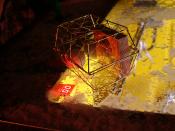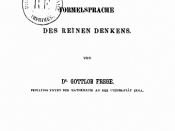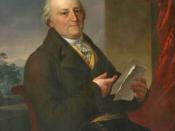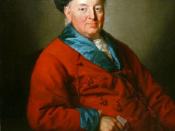Is Number Subjective? In section twenty-two of The Foundations of Arithmetic, while in a discussion of whether or not number is a property of external things such as a pile of playing cards, Gottlob Frege writes "The Number 1, on the other hand, or 100 or any other Number, cannot be said to belong to the pile of playing cards in its own right, but at most to belong to it in view of the way in which we have chosen to regard it." Reading this passage alone, Frege may seem to be implying that number is something subjective, something that depends on a decision on our part. Yet in section forty-seven Frege writes "That a statement of number should express something factual independent of our way of regarding things can surprise only those who think a concept is something subjective like an idea. But this is a mistaken view."
What is Frege's meaning in the first passage, since its apparent implications seem to be contrary to the passage in section forty-seven? With further investigation, it becomes apparent that he is not saying that statements of number are subjective, but that statements of number are really statements of concept, and therefore are objective. The way which we choose to regard it an object is another way of saying the objective concept which we choose to apply to an object, which may be subjective. But number is never subjective.
In the first passage cited above, where Frege writes that the number that belongs to the pile of playing cards depends on "the way in which we have chosen to regard it," he is not claiming that the number belonging to the pile of playing cards is a subjective decision on our part. In fact, Frege insists repeatedly throughout the book that number is something objective. Rather, he is saying that the number we assign to the pile of playing cards, or any external object or group of objects, does not really belong to the object at all, but to the objective concept we are applying to the object or objects. We do not abstract numbers from objects as some have claimed, but abstract objective concepts from objects, from which we discover the numbers.
If we apply the objective concepts such as number of playing cards, number of full decks of playing cards, or number of spades, clubs, or hearts in a pile of playing cards, we will discover different numbers. However, our subjective way of regarding each of these individual concepts does not make any difference as to which number belongs to it, since the relationship of number with each of these concepts is factually independent of our subjective way of regarding it.
Frege states in section forty-six that an external phenomenon, such as a pile of playing cards, can legitimately have different numbers assigned to it. This is not because number is subjective, but because we can choose to apply different concepts to it, and hence discover different numbers. The only thing that might be subjective is our choice of which pair of objective glasses, or which concept, we are going to use to view an object. He explains that "what changes here from one judgment to the other is neither any individual object, nor the whole, the agglomeration of them, but rather my terminology. But that is itself only a sign that one concept has been substituted for another." Therefore, "the content of a statement of number is an assertion about a concept." Statements of number are really statements of concept, about something objective, not subjective. Since concepts are not external things, number cannot be a property of external things.








